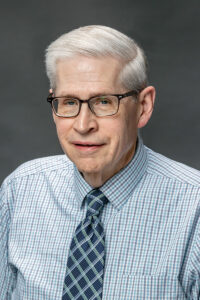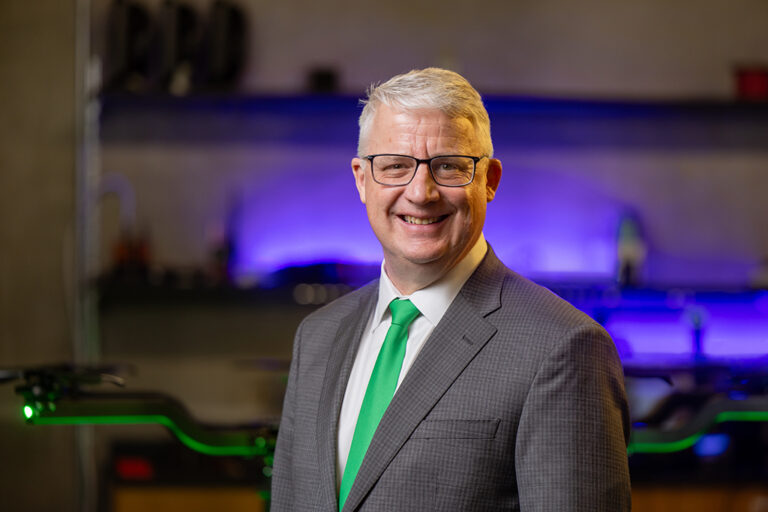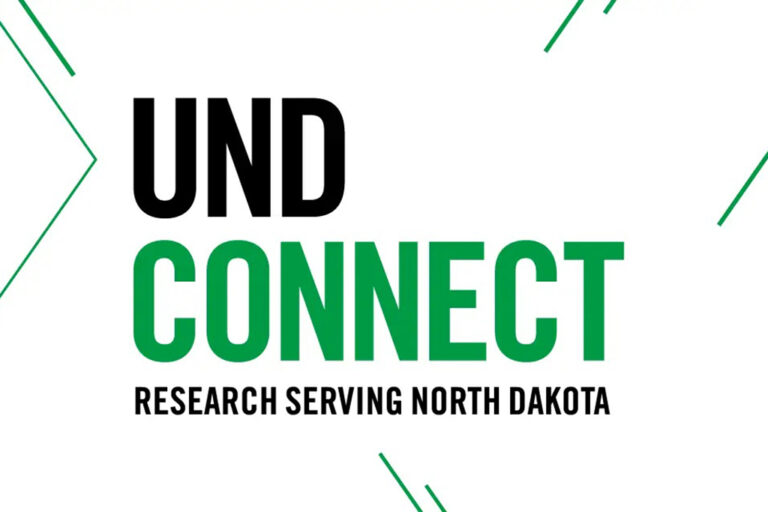UND’s research veterans help new researchers get started
From proposal writing to project management, mentorship is key

Thomasine Heitkamp and Mike Mann might have thought retiring from UND would bring their long, productive and successful research careers to an end.
But with each holding more than 40 years of experience in successfully applying for and running research projects that have brought tens of millions of research dollars to the University, leaving them on the bench wasn’t in the cards.

Instead, the duo is working with the Vice President for Research & Economic Development Office and others across the campus to help new researchers increase their odds of submitting a successful proposal and manage the challenges of operating multidisciplinary research projects.
“Sometimes young researchers need a boost when transitioning between their Ph.D. or the postdoc-stage of their careers,” Mann said. “It’s a transition toward writing proposals and developing ideas for proposals. We want to help them get started.”
To accomplish this, UND earlier this year launched the Early Career Scholars Program, which develops multidisciplinary research teams on campus to support the University’s early career faculty in securing outside funding for their work. The program is designed to support the goals of the UND LEADS Strategic Plan.
Strategic plan support
“We wanted to align with the strategic plan in terms of developing multidisciplinary teams engaged in collaborative research,” Heitkamp explained. “We wanted to not only build faculty capacity through mentorship, but also be sustainable in their careers, something they feel passionate about, something they could work on as a team and move forward.”

During New Faculty Orientation last month, Heitkamp and Mann were joined by researchers Rebecca Rozelle-Stone, professor of philosophy and ethics, and Alena Kubatova, Department of Chemistry chair, to teach sessions on launching a successful research program. Most of the 67 new faculty attending orientation took part in the classes to learn about campus resources available to them.
“Mike and I continued on in our roles after we retired because we liked mentorship,” Heitkamp told new faculty members. “That’s singularly the reason we stayed on: we can help young faculty.
“Get a strong and good mentor for those early career awards and then work through your department chair,” she advised. “And don’t be shy about asking questions.”

Last spring, four UND research teams each received $30,000 awards through the ECS program after their proposals were selected from among 12 submitted from six colleges and the School of Medicine & Health Sciences.
Justin Berg, professor of sociology, who’s worked with Heitkamp and Mann to develop the program, noted a key aspect involved in the awards.
“There’s a mentor for each team, so there’s some guidance there, as well as making institutional connections with people at UND,” he said. “The mentors may also know people outside of UND, such as some of the program officers or sponsors at award agencies.”
Early Career Scholars
The proposals were selected by a seven-member review committee. The projects and research teams are:
- The impacts of rocket exhaust on the atmosphere’s chemical composition and possible changes to atmospheric processes from an increasing number of rocket launches. Principal investigator Hallie Chelmo, assistant professor of mechanical engineering; co-principal investigator Marwa Majdi, postdoc research fellow, atmospheric sciences; and senior mentor David Delene, research professor, atmospheric sciences.
- The real-time activities of immune cells within the central nervous system during an inflammatory event in live animals. Principal investigator Kumi Nagamoto-Combs, assistant professor, biomedical sciences; co-principal investigator Bo Liang, assistant professor, biomedical engineering; and senior mentor Colin Combs, chair, biomedical sciences.
- “Indian status” on trial: The impact of a defendant’s level of Indian “stereotypicality” on mock jurors’ Indian status and guilt determinations within the intersection of psychology, law and American Indian studies. Co-principal investigators Dan Lewerenz, assistant professor, School of Law; Kimberly Schweitzer, assistant professor, psychology; and senior mentor Daphne Pedersen, professor, sociology.
- Machine learning for aviation weather: Real-time estimation of the cloud ceiling from camera images and satellite data using deep-learning features for aviation operations involving unmanned aircraft systems. Principal investigator Majdi; co-principal investigator Jared Marquis, assistant professor, atmospheric sciences; and senior mentor Delene.
John Mihelich, vice president for research and economic development, said, “There’s a lot of energy on campus around enhancing research, and that is evident in the engagement in this program. I am grateful for the leadership from Thomasine, Mike, and Justin in our office and for the participation from faculty. I look forward to success from this program and from the great new collaborative research directions proposed by the seed awardee teams.”
Support across campus
A key part of the ECS program is a series of workshops on proposal writing by presenters that include Grand Challenge Champions, associate deans for research from all colleges and faculty members with successful grant-writing experience. The program is supported by UND President Andrew Armacost and Provost Eric Link, both of whom have spoken at the workshops.

“Thomasine and I answer questions anyone might have and give them ideas on how to be more successful,” Mann said. “Rather than just giving out the seed money, we try to be more hands-on than we have in the past. Between mentoring and training, we hope to lead them farther down the path to success.”
Heitkamp pointed out that those who submitted unsuccessful proposals to the ECS program also received helpful feedback and were introduced to other researchers on campus.
Team members from the four funded proposals meet monthly with Heitkamp and Mann to discuss their projects.
“You can’t give them the money and assume everything’s going to be in place,” Heitkamp related. “There are going to be hiccups. Things happen when you’re working in research and when you’re working on proposals. So how can we help them troubleshoot? How can we support them and be collaborative to them?”
Another key member of the VPRED team is Trinity Bohlman, director of strategic financing, operations and reporting, who sets up the awards through the vice president for research office and manages the finances.
Mann told UND’s new faculty – one of the largest groups in recent years – they were coming to the University at a great time.
“Ten years ago, we were facing budget cuts and enrollment was a little rocky,” he noted. “Now enrollment is up and research dollars are up. UND has a very strong, vibrant research community.
“We need cross-disciplinary involvement that includes pretty much every discipline across campus for UND to showcase the best and most impactful research.”



